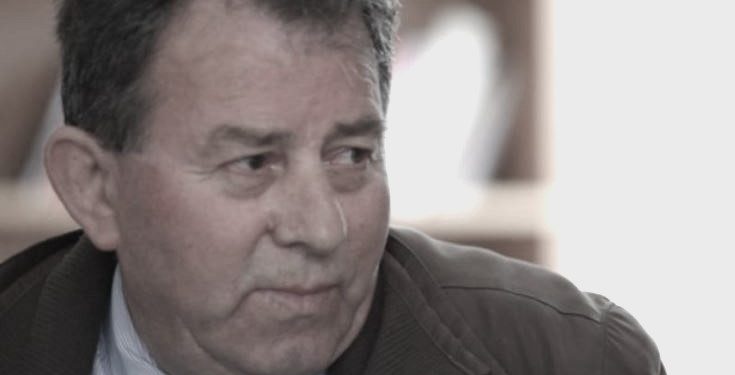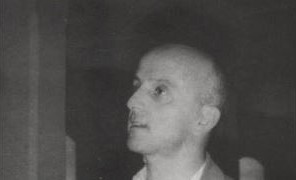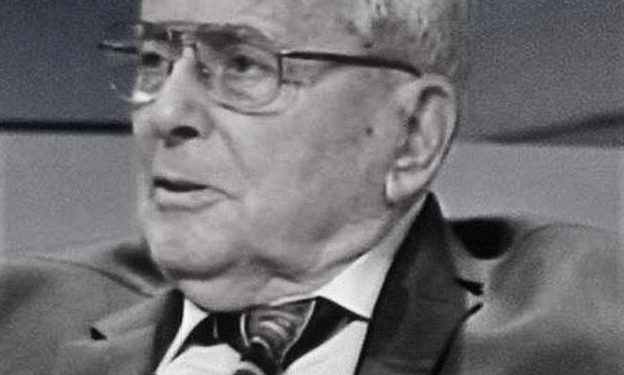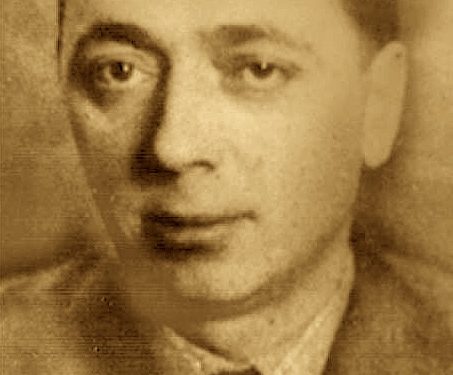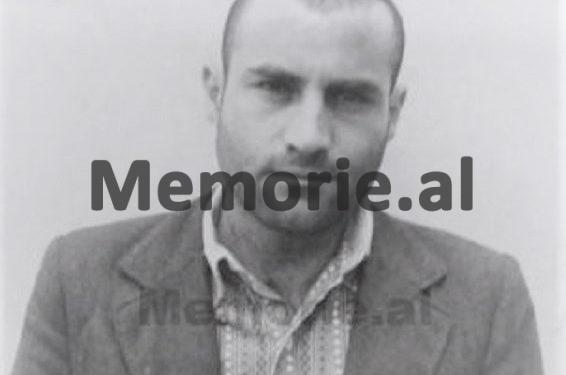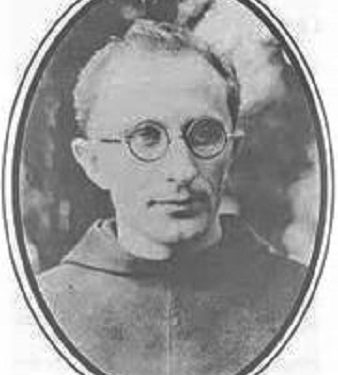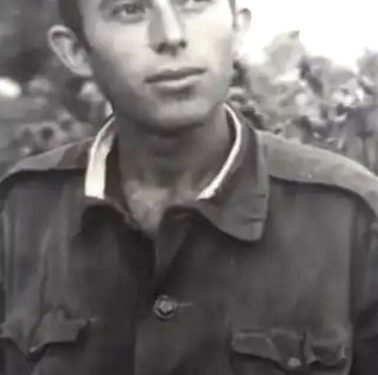By Shkëlqim Abazi
Forty-three
Memorie.al / I were born on 12. 23. 1951, in the black month, of the time of mourning, under the blackest communist regime. On September 23, 1968, the sadistic chief investigator, Llambi Gegeni, the ruthless investigator Shyqyri Çoku, and the cruel prosecutor, Thoma Tutulani, brutalized me at the Branch of Internal Affairs in Shkodër, they split my head, blinded one eye, deafened one ear, after breaking several ribs, half of my molar teeth, and the thumb of my left hand. On October 23, 1968, they took me to court, where the pitiful Faik Minarolli gave me a ten-year political prison sentence. After half of the sentence was cut, because I was still a minor, sixteen years old, on November 23, 1968, they sent me to the political camp of Reps, and from there, on September 23, 1970, to the Spaçi camp, where on May 23, 1973, during the revolt of the political prisoners, four martyrs were condemned to death and executed by firing squad: Pal Zefi, Skënder Daja, Hajri Pashaj, and Dervish Bejko.
On June 23, 2013, the Democratic Party lost the elections, a process more than normal in the democracy we aspire to. But on October 23, 2013, the General Director of the “Renaissance” government sent Order No. 2203, dated 10.23.2013, for the release from duty of a police officer. Thus, Divine Providence was interwoven with the Neo-communist “Renaissance” Providence and, precisely on the 23rd; I was replaced by, no less and no more, but the former Security operative of the Burrel Prison. What could be more significant than that?! The former political prisoner is replaced by the former persecutor!
The Author
SHKËLQIM ABAZI
R E P S I
(Forced Labor Camp)
The First Meeting (Continued)
(The Boat Sunk in the Trough)
Like all children, I liked playing sports games with the older kids and watching movies shown at the city’s only cinema. To make time for these, I sometimes neglected my lessons. But because I felt under the constant surveillance of my father’s watchful eye, I inevitably returned to books, studied diligently, and insisted on being questioned so that I would be valued as positively as possible.
Naturally, all this effort at the time was done for my father’s sake, to make him happy and ease, at least a little, the burden of the overwhelming servitude he had to endure to secure material income for us during those years of economic misery.
Raised in a pro-education family, but in a neighborhood of gardeners and laborers who considered schooling “a heavy tribute that had to be paid to the state’s mandatory laws, which punished parents with fines if they didn’t send their children to school up to the age of sixteen,” I stood out from the others. Although I was surrounded by the pressure of this opinion-which considered diligent students “mama’s boys,” or those who continued beyond compulsory education “a bit crazy”-thanks to the passionate and excellent teachers who had been brought to our city for “rehabilitation,” I managed to break through this circle.
These good teachers, seen as politically untrustworthy and ideologically unsuitable to educate children in the capital’s schools, were brought to us as semi-internees. My generation of Berat peers had the luck to be educated at higher levels than others. This is a tribute in honor of those teachers who never smiled but gave us the best of themselves: knowledge.
In my working-class neighborhood, they admired the muscles of Ali Puka, Cassius Clay, Steve Reeves, and the antics of a hardened pickpocket and gambler like Raj Kapoor more than the enlightened mind of Einstein. At that time, a ten-year-old would hang slingshots for thrushes around his neck, take fishing baskets and rods, throw a pickaxe over his shoulder, and set off like an adult to earn a crust of bread. Boys were considered the “support beam of the house” by age fifteen, and then married by seventeen, so that when the day came for them to be drafted as soldiers, they would already be fathers of two or three children, thus escaping military service. Anyone who pursued books after that age was called “farted out of their mind”! And don’t even let them see you buying “books” and walking around the neighborhood with them; “deranged” was the mildest epithet you might hear.
My ears often caught the comments of my neighbors, who pitied me with expressions of regret: “What a shame! That boy, school will drive him crazy!” Then the gossip was continued by the old women, who killed time on the benches in the alley, with the reprimanding phrase: “Oh Lime, poor Lime, what have you done to the boy!” This is how they judged my father, while calculating my black fate. A few years later, I ended up in prison. The prediction of the neighborhood’s Cassandras seemed justified:
“There, see where too much schooling leads you! Boys, hurry up and learn a trade, if you don’t want to end up ‘there,’ like him!” the elderly advised the neighborhood boys. They used my case as the bogeyman that scares crows in the garden. “There,” “there,” “there”! By emphasizing the term “there,” they alluded to the prison and substantiated the argument; but at the same time, they did not mention the word “prison,” because they feared the evil that: “If you speak its name, the hour will bring it to your door!”
Regardless of the comparative reference, this community loved and respected me in its own way. As indigenous locals, they expressed pain for my “catastrophic” fate, never missing an opportunity to console my parents for the grief that befell them, and wished me to get out of “there” as soon as possible. This was confirmed by the fact that as soon as I was released from “there,” the majority of these simple people welcomed me with kindness and made room for me in their midst, without fearing the consequences and without considering the hostile attitude of communist officials.
But despite the sincerity and purity that characterize the residents of this neighborhood, education remains their most delicate point; they are still the least educated community in the city today. The tradition has started to change, but it has not yet reached the level of other neighborhoods.
As for every student, the first days began with the ordinary troubles: books were missing, notebooks were needed, didactic tools were insufficient, etc. Although I managed to secure some textbooks with the help of friends and the teachers themselves, I still had shortages. Notebooks and notepads were gifted to me by the elders as a stimulus; lesson handouts were given to me by the teachers from their own materials, and the rest I ordered from my family. Thus, I was somewhat complete. In the conditions I was in, I couldn’t ask for the impossible, meaning I couldn’t expect cabinets, laboratories, or even a blackboard.
I have mentioned somewhere above that perhaps I must have been the strangest student on the planet! I studied secretly in corners and crevices, when everyone else boasted about the advanced methodology of learning openly. On the contrary, I was careful not to catch the eye of the command and the spies.
When the teachers explained the lessons to us, they camouflaged it as harmless games, because the spies searched everywhere and everyone. Frequent gatherings were reported as saboteur groups or as plots for escape attempts, or even worse, as a camouflage for conspiracy against the state.
But my teachers behaved even more strangely; those ragged men, ravaged by disease and hard work, despite the incessant suffering and limitless deprivations, found the time and courage to defy fatigue, overcome troubles, and often sacrifice even those few moments of rest for my preparation. Nevertheless, they remained kind, yet scrupulous to the point of pedantism!
After that, my daily life changed. The schedule of activities underwent a fundamental change, channeled within strict markers. As soon as I finished the cycle of obligatory commitments, the voluntary troubles began. That is, as soon as I returned from work, I held my breath for the books. Books and papers surrounded me everywhere. In line at the soup cauldron, I would walk around reading some scrap of paper, I ate bread with notes in front of me, and I even performed my physiological needs with notes in my hands.
Wherever I could, I opened pages and pads; when I couldn’t, I repeated by heart what I had learned before. I walked around talking to myself, loading the cart with dirt and stones with the shovel, while mentally reciting poetry or whispering French vocabulary.
The lessons were given to me according to an order that the teachers, in mutual agreement, had decided upon. They drafted weekly, monthly, quarterly, and yearly work plans, with at least four thirty-minute lesson hours scheduled. Six days a week, twenty-four hours of lessons; no less than regular school! Excluding the hours of physical work, which I had in abundance, the hours of physical education, which still strained me with tools like the shovel and others, and the hours of music and drawing, which were considered optional, the methodologists judged the theoretical subjects to be more than sufficient for the academic year. Then, during the summer holidays, the curriculum could be expanded as desired. Thus, I was deficient; my time was maximally limited, so much so that every free minute seemed like a luxury.
I quickly overcame the consequences of the isolation cells; my memory started working wonderfully. The initial results made my teachers optimistic, so they gave me the full dose of the subject matter, but in the meantime, they also increased the demand for accountability. I was exhausted to the point of depletion, but I also felt the satisfaction of the praises for my progress in lessons, especially enjoying it when I saw my good friends marvel. I became a student once again! A student with the entire mentality of that age!
When I was evaluated, I rejoiced at the grade, just like in school benches; when I was reprimanded, I was equally discouraged. But for major reasons, unlike my peers, I was often forced to interrupt my lessons, to spend days and nights tied to poles, and weeks and months in isolation rooms. Perhaps I was the most unique student on the planet, enjoying the privilege of coexisting non-stop with my teachers: sleeping in the same dormitory, and even working with a part of them in the same brigade, where we dug, unloaded, and pushed carts full of dirt and stones for eight, ten, or eleven hours.
I no longer had time for entertainment, but the very friends who spurred me onto that path encouraged me to learn more and more. However, during those few moments of rest, in the ten-minute break between two hours, I found the opportunity to talk with the elders. The moments I spent with them seemed to clear and refresh my memory, but at the same time, they brought me back to the harsh reality I was slowly drifting away from. The perseverance with which I studied was noticed by my friends, who largely encouraged and liked it, but to keep me in touch with reality, they occasionally distracted me.
One day, with his inseparable irony, Uncle Sheref reprimanded me: “Hey kid, you’ve started flying so high! I fear that once you reach the air, if it’s meant to be, you’ll forget about us! By God, you’re right!” He carved with a knife on the wood he held in his hand, and then added: “Never mind, we’ve bothered you enough with our old men’s babbling!”
“No, Uncle Esherif, don’t say those words to me, you are and will remain my best friends!” I interrupted, exasperated.
“Come on, go ahead! Buy wisdom from us old folks, don’t listen to our farts!”
Submerged in the unreal world of books, burdened by worries like everyone else, I continued two years of academic life at the strangest Academy on the globe, the most unknown and illegitimate by any representative instance of world culture and science. I wholeheartedly thanked the “pedagogues”; from the first “founders” of the late forties onward, the entire brilliant constellation of teachers who, from time to time, due to causes and circumstances beyond their control, handed the baton to each other in this “Lost Soul” Academy (Akademia Humbëtirë).
Those brilliant scholars, who with self-denial and untold sacrifices kept alive the educational spirit of our great national revival figures, nurtured entire generations of young people who filled the “auditoriums” of this Academy, without titles or scientific degrees, but with real and true, undeformed, absolute knowledge, like life and death. Over the decades, they produced a group of solid intellectuals, despite being without equivalent diplomas.
In the “Lost Soul” Academy, their modest contribution-with the composition of texts and theoretical-scientific lectures-would be given by figures ranging from the former Prime Minister of the Monarchy, Koço Kota, to the former Minister of Education, Mirash Ivanaj. Beside them, distinguished political figures, history, literature, and arts figures would serve, such as: the poets Kudret Kokoshi, Zef Jushi, Visar Zhiti; the translator of the Iliad, Gjon Shllaku and Amik Kasaruho; the distinguished philosopher Arshi Pipa; the sociologist Sami Repishti; the unrivaled musicologist Ramadan Sokoli; the lyrical singer with the brilliant voice, Lukë Kaçaj; the painters Maks Velo, Sadri Ahmeti, Vangjush Tushi, Edison Gjergo; the traditional writers Patër Pjetër Meshkalla, Dom Nikollë Mazreku, Patër Zef Pllumi, Mitrush Kuteli, Petro Marko, Astrit Delvina, Kin Dushi, Pjetër Arbnori; the polyglot Vexhi Buharaja, Ilia Thereska, and tens and tens of others who, for forty-five consecutive years, kept the lamp burning with oil on the journey toward the light and illuminated the darkness of the black communist night. With Herculean will and patriotic devotion, they prepared the generations of tomorrow at the “Lost Soul” Academy, who would convey the enlightenment ideas, despite the fact that today the sycophants of the communist court claim dissidence.
Among them, I would also list my teachers at Reps, although more modest than the former, but who nevertheless contributed with the same dedication to this noble mission. I will briefly tell about my former teachers, as I normally knew them, since they were the first to guide me on the path of knowledge and remain the most unforgettable-just as the memory of the first-grade teacher who guides your hand for writing remains indelible in every child’s memory, even after they have completed several faculties. I can mention the later ones, but only when it is their turn, because after every transfer, death, or release-which, to tell the truth, happened quite rarely-a part of the teachers usually changed, who were then replaced by others, as happened to me.
The Teacher of Language and Literature: Hodo Sokoli
Hodo Sokoli was a man around fifty, completely prematurely pale and white-haired, with a short-trimmed mustache. A fanatic for order and cleanliness. From the first introduction, I understood that I was dealing with an intellectual of high levels; he radiated culture and perfect education from every pore and cell. He had been sentenced with the group of Hafëz Sabri Koçi. Hodo was a scion of the distinguished Sokoli clan from Shkodra. His namesake grandfather, Hodo Begu, is remembered as one of the most brilliant figures in Albanian Renaissance history, a distinguished leader of popular uprisings in defense of territories and territorial integrity against the Turks and Montenegrins. But this famous genesis did not prevent Enver Hoxha from sentencing the grandsons of the popular tribune as “enemies of the people”-first the famous musicologist, Ramadan, and later his equally distinguished brother, Hodo. I studied language and literature with him for about two years.
Hodo was a professional pedant, very correct, but a strict taskmaster. After the lesson, he transformed into a gentle soul, even humble. I benefited greatly from him, especially in literature, where I took the lessons in writing. He prepared them himself; to make it easier for me, he gifted me ready-made notes written in fine handwriting, where the one-dimensional letters lined up in a single column, like soldiers in a row. He possessed a phenomenal memory. Thanks to him, I learned about Fishta, Koliqi, Konica, Pipa, etc., writers cursed by communism and expelled from the Pantheon of Albanian Literature.
That wise teacher, at first glance, seemed uninterested in the affairs of this world, giving the impression of a startled simpleton, but in fact, he was navigating the illusory space of freedom, without barbed wire, without ideological handcuffs, outside the prison cage. His intransigent stance during the Spaç revolt, May 21-23, 1973, and his courage in the special trial, speaks volumes. He represented a safe of infinite knowledge; one only had to find the golden key to open those doors. For my whole life, I will remain grateful to Professor Hodo for the sacrifice he made to expand my horizons of knowledge!
The Teacher of Mathematics and Exact Sciences: Marko Popoviç and Eng. Hamdi Haska
In fact, I had two such teachers: Marko Popoviç for theory and Eng. Hamdi Haska for practice. Marko was not a particularly distinguished teacher because, as a Slavophone, he had taught all the time in the schools of the Vraka villages. This was the visible part, but he was actually quite competent in his subject. When you saw him so skeletal, with his optical glasses hanging over the bridge of his thin nose, weak, bony, you wondered how this poor soul, where one breath entered and another left, could even stand, as even water seemed to get stuck in his throat?! But behind that anemic appearance hid a dynamic epigram; all his genius was locked in equations and theorems, hypotheses and unknowns with x’s and y’s. I was amazed when he explained; he made the exact sciences so romantic that you would think he was telling fairy tales or stories, so much so that even though I wasn’t fond of numbers, I was forced to learn them thoroughly, just not to be embarrassed in front of him. Then, Marko and I worked in the same brigade, and he never hesitated to explain it to me all over again during every free moment.
In practice, I had found an assistant professor: the mechanical engineer, Hamdi Haska. Hamdi had completed his studies in Moscow, “in a field that was imposed on me,” as he he told me: “No, man, I couldn’t choose the field; the Party had determined it back in Tirana. I couldn’t object; this was my fate, and I submitted. If I had completed my studies in the field I loved, perhaps I wouldn’t be here now!” he consoled himself, to justify his passion for mathematics. Whenever I got stuck in the multitude of numbers of some exercise or equation, or even in trigonometry and stereometry, I would turn to Hamdi, and he eagerly awaited the opportunity to show his talent as a number magician, sometimes even thanking me for the “troubles” I gave him:
“Thank you, Çimi, you create variation for me, because my mind has completely left all those projects and machinery sketches; at least I have fun with these!” He then encouraged me: “Don’t hesitate, man, whenever you need me, I’m ready!” So, I had found the logarithm table and the key to mathematical enigmas; all I had to do was bring them to him, and they were solved. I thank both of them-Simoni, for the sacrifice he never accepted as such, and Hamdi, who, even though he claimed to be entertained by the game with numbers, often relieved my discomfort. Thank you!
The Teacher of History: Agim Musta
Agim Musta, a thirty-five- to forty-year-old Gjirokastrian residing in Tirana. He was a plump, red-cheeked, cheerful, and radiant man. For many years, he had taught in the district of Berat, where he had also met people of mine. A group of intellectuals had been sentenced for the illegal formation of the Social-Democratic Party (over the years, I would get to know almost all of them, and they would become my friends). Agim was an objective historian, explaining events and facts in detail, interpreting them with realism, without politicizing them or glorifying their protagonists, viewing them in the light of the mentality of the time they occurred.
In his lectures, I heard truths previously unknown or distorted by communist historiography. When I took the lectures in writing, I had to concentrate all my attention on the notebook because the literary interpretation he gave to historical facts would mesmerize you, and only at the end would you realize that you hadn’t written anything. Then, embarrassed, I would ask him to lend me the lecture to prepare for the next day, but he would never give them to me. He had a quirk; he kept his personal notebooks with the fanaticism of Harpagon. We explained this virtue-vice with the typical Gjirokastrian anecdote “who ties the cat before the meal” (referring to extreme frugality). But in fact, he wanted to instill in every student a sense of order and diligence.
I am especially grateful to the professor for two things: first, for those truths I mentioned above; and second, for that Gjirokastrian order in keeping permanent notes even for things I thought I knew. But his most valuable lesson remains the maxims he cited most often: “Repetition, the mother of knowledge, and notes, its father,” as well as “History is made only once, but it is written a thousand times!”
With Agim, we had the fortune to reach the much-desired days of democracy, and the unique works of rare value by the writer Agim Musta saw the light of publication and are now the property of the golden fund of Albanian historiography. With admirable courage, he exposed the communist falsifying historians and continues to be active with his distinctive pen. I have thanked and continue to thank the professor and my friend, wishing him a long life and a golden pen.
The Teacher of Geography and Astronomy: Vangjel Kule
My teacher for Geography and Astronomy was Vangjel Kule. He was about thirty years old, with perfect culture and education. The typical expression “dear” took its true meaning in his mouth, as he exuded kindness to everyone and everywhere. Vangjo and I were patriots, and even more than that, from the same region. Our families had moved to the city from the same area, the Shpiragu district; indeed, from two neighboring villages, three kilometers apart. They were from Sinja, we from Sadovica; our ancestors had an old friendship.
As such, we quickly established bridges of contact and reinforced the traditional family friendship, as we also worked in the same brigade. Vangjeli, the teacher, seemed to change his skin, taking on other values; he flew into another universe, emanating the aura of the dignified educator. From the height of the lectern (which, in fact, we didn’t have, but was a plank of wood nailed to four stakes that after the lesson returned to its primary function for which it was erected, meaning it turned into a dough-kneading board for peeling onions and potatoes), it seemed as if he was sailing on clouds./Memorie.al




